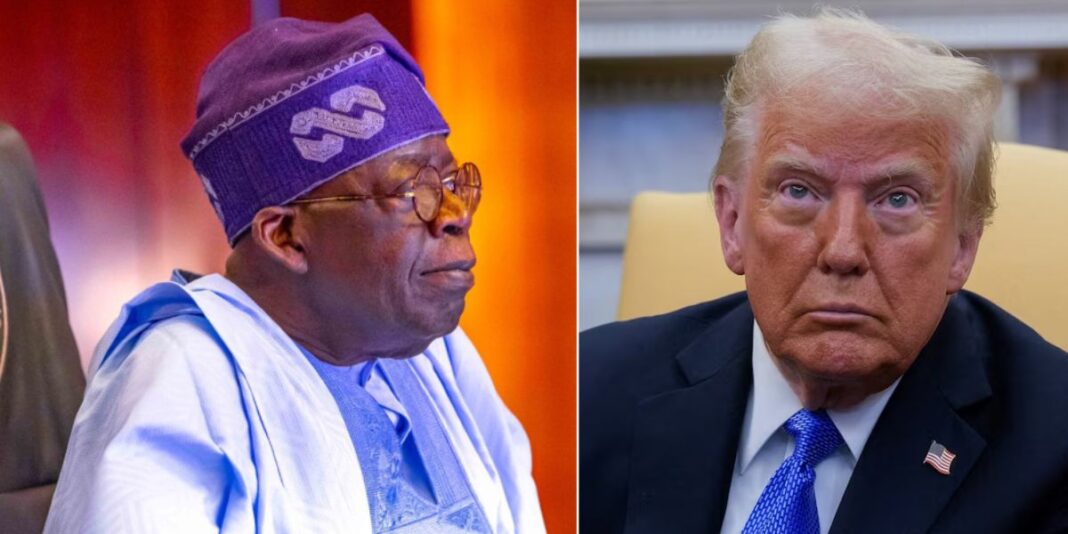The Nigerian government has urged the United States to ensure that the planned deportation of 85 Nigerians is conducted with dignity, citing concerns over the treatment of deportees and the broader implications for bilateral relations.
The Minister of State for Foreign Affairs, Bianca Odumegwu-Ojukwu, made this appeal during a meeting with the U.S. Ambassador to Nigeria, Richard Mills Jr., in Abuja on [date of meeting]. She emphasized the emotional, financial, and logistical strain faced by deportees and called for a more compassionate approach.
Odumegwu-Ojukwu revealed that 201 Nigerians are currently detained in U.S. immigration centers, with 85 already slated for deportation. She stressed the need for adequate time for deportees to arrange their affairs before repatriation, adding that grouping individuals convicted of violent crimes together with those who merely overstayed visas or had their appeals denied was highly problematic and disrespectful.


The Minister also addressed Nigeria’s concerns over the suspension of the U.S. Drop Box Visa Policy, which previously allowed certain visa applicants to renew their visas without an in-person interview. She urged the U.S. to reconsider its decision, warning that its suspension could create unnecessary hardship for legitimate travelers, including students, business professionals, and families.
Citing the 14,000 Nigerian students currently studying in the U.S., Odumegwu-Ojukwu highlighted growing anxieties over possible visa restrictions. She further pressed the U.S. to maintain its USAID programs in Nigeria, particularly in light of the recent challenges faced by some non-governmental organizations (NGOs) operating in the country.
While acknowledging the positive trajectory of post-pandemic trade relations, she encouraged increased U.S. investment in Nigeria, particularly in sectors like mining and infrastructure. Notably, the expiration of the African Growth and Opportunity Act (AGOA) has raised concerns about Nigeria’s future trade prospects with the U.S.


U.S. Responds to Nigeria’s Concerns
In response, Ambassador Mills clarified that the Drop Box Visa Policy has not been permanently suspended but is under review as part of the U.S. government’s broader immigration policy adjustments. He assured that USAID remains committed to supporting humanitarian initiatives in Nigeria, though some NGOs have faced bureaucratic and funding challenges.
On the issue of deportation, Mills stated that all repatriated Nigerians would be flown directly to Lagos, with no alternative drop-off locations, such as Abuja or Port Harcourt, being considered. The Minister had reportedly requested flexibility, citing logistical challenges and security concerns associated with processing a large influx of returnees in Lagos. However, Mills insisted that U.S. immigration policy does not typically offer foreign governments a choice in repatriation destinations.
“The first group will consist of individuals convicted of crimes and those who have violated U.S. immigration laws,” Mills explained. “Some had appealed their cases but were denied and must now leave.”
The Nigerian government, however, has expressed discomfort with the U.S.’s approach of lumping all deportees—regardless of their circumstances—onto the same deportation flights. Critics argue that treating individuals who overstayed visas the same as those convicted of serious crimes is both unfair and damaging to their reputations.
Concerns Over U.S. Aid and Trade Relations
Nigeria’s concerns over USAID operations come amid reports that certain NGOs have struggled to access funding and operational support due to new U.S. policy shifts. While the U.S. Embassy in Nigeria has not publicly confirmed specific disruptions, diplomatic sources suggest that increased scrutiny of aid distribution has affected humanitarian efforts in some sectors.
The Minister also pressed for clarity on the post-pandemic trade framework between Nigeria and the U.S., particularly following the expiration of AGOA, which previously provided Nigerian exporters with duty-free access to the U.S. market. With AGOA’s benefits no longer in place, Nigerian businesses may face challenges in sustaining trade relationships with U.S. partners.

Despite the diplomatic tensions, Mills reaffirmed the U.S. government’s commitment to strengthening economic and political ties with Nigeria, assuring that trade and investment remain key priorities.
As Nigeria and the U.S. navigate these pressing issues, it remains to be seen how both governments will address the delicate balance between immigration enforcement, diplomatic relations, and trade cooperation.
The meeting between Nigeria’s Minister of State for Foreign Affairs, Ambassador Bianca Odumegwu-Ojukwu, and U.S. Ambassador to Nigeria, Richard Mills Jr., took place at the Tafawa Balewa House in Abuja. The meeting was reported in a statement released on Sunday, February 16, 2025, by the minister’s media aide, Magnus Eze.
Headlinenews.news will continue to monitor developments on this issue.




